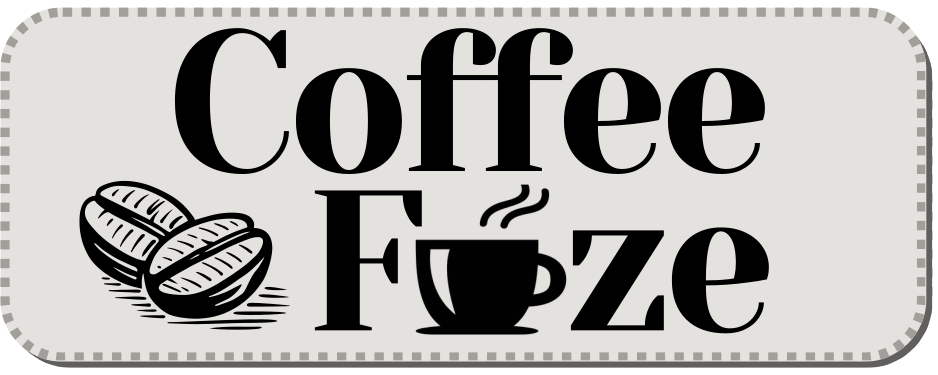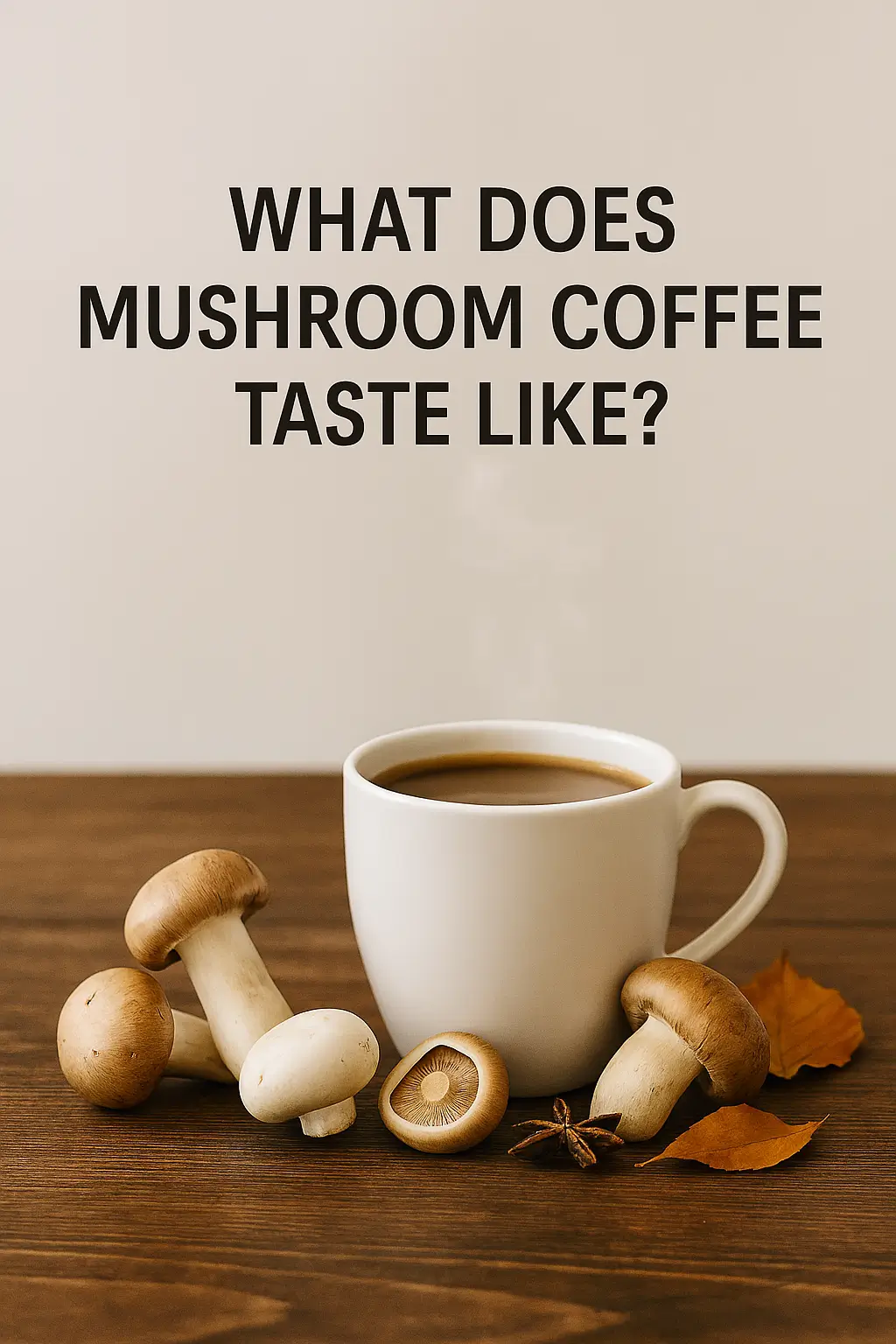Mushroom coffee has really taken off, hasn’t it? It’s become a popular alternative to your regular brew, promising that familiar coffee kick alongside some impressive wellness benefits from medicinal mushrooms. Imagine your usual morning pick-me-up, a comforting cup of coffee, but with an adaptogenic twist. This guide will help you pinpoint what truly makes a mushroom coffee shine, so you can pick one that perfectly fits your health goals and taste buds.
- What is mushroom coffee and does it taste like regular coffee?
- My opinion on how mushroom coffee taste like: a few weeks test – mushroom coffee vs regular coffee
- Health benefits: why drink mushroom coffee?
- Potential side effects to consider
- How to choose the best mushroom coffee: essential criteria for quality
- Popular functional mushrooms in coffee blends and their specific benefits
- Mushroom coffee brands: taste profile a comparative look
- Conclusion
Note: We’re not medical professionals, and this article is based on our own research, experiences, and publicly available information. It’s intended purely for educational purposes. If you’re thinking about adding mushroom coffee to your routine — especially for health-related reasons — we recommend speaking with a qualified healthcare provider first.
What is mushroom coffee and does it taste like regular coffee?
Ever wondered what mushroom coffee actually is? Mushroom coffee is regular coffee beans blended with powdered or extracted medicinal mushrooms. The goal is to give you a smooth, sustained energy boost, helping you skip those common coffee jitters, while also delivering extra health benefits from mushrooms like lion’s mane, chaga, and reishi.
Mushroom coffee does not taste like mushroom, it taste like coffee.
My opinion on how mushroom coffee taste like: a few weeks test – mushroom coffee vs regular coffee
I was skeptical at first, but after switching from regular coffee to mushroom coffee for a few weeks, I noticed the taste was nearly the same, a little earthy flavor. What stood out was the energy. It felt more steady, and I didn’t have the urge to reach for a second cup like I usually do with regular coffee. Also a great alternative for those sensitive to caffeine, because it has less caffeine than regular coffee.
Health benefits: why drink mushroom coffee?
So, why should you consider adding mushroom coffee to your routine? According to studies and health experts, drinking it regularly can bring some promising health advantages, all thanks to the specific functional mushrooms thoughtfully blended into your cup. You might experience:
- Immune system support: Mushrooms like reishi, chaga, and turkey tail are packed with compounds such as beta-glucans, polyphenols, and antioxidants. These may help strengthen your immune system, giving your body a little extra defense and support gut health.
- Enhanced cognitive function and focus: If you’re looking for a mental boost, lion’s mane is your go-to mushroom. It’s well-regarded for supporting brain health, sharpening memory, and improving overall mental clarity.
- Stress reduction and calm energy: Ever feel a little too wired after coffee? Adaptogenic mushrooms, especially reishi, can help. They work by regulating cortisol levels, which helps ease stress and promotes a more relaxed, yet focused, state of mind.
- Energy and stamina boost: Cordyceps is a fantastic mushroom if you’re looking to amp up your energy and stamina. It has the potential to increase your vitality and combat fatigue without giving you the jitters that regular coffee sometimes does.
Potential side effects to consider
While mushroom coffee comes with plenty of upsides, it’s also wise to be aware of potential downsides. For some, it might cause mild digestive issues, like nausea or other stomach discomfort. And though it’s uncommon, allergic reactions to certain mushroom types are possible, so keep that in mind, especially if you have known allergies.
Even if mushroom coffee typically has less caffeine than traditional coffee, you could still feel caffeine-related effects, particularly if you’re sensitive. This might include jitters, heart palpitations, anxiety, elevated blood pressure, dizziness, or muscle tension. If you have any pre-existing health conditions or take medications, it’s always a good idea to chat with a healthcare professional before making mushroom coffee a regular part of your routine.
How to choose the best mushroom coffee: essential criteria for quality
So, how do you sort through all the options to find the ideal mushroom coffee for you? It really comes down to a few core factors. When you’re evaluating a product, pay close attention to its sourcing, extraction methods, and third-party testing. These aspects tell you a lot about the quality you’re getting:
- Mushroom type and quality: fruiting bodies are important: When you’re picking a mushroom coffee, check that it contains functional, medicinal mushrooms known for specific health benefits. Think about lion’s mane for cognitive support or chaga and reishi for immune health. Here’s the really important part: look for brands that use the fruiting bodies of the mushrooms, not just the mycelium grown on grain. Fruiting bodies typically contain higher levels of those active compounds that give you the benefits you’re looking for.
- Sourcing and purity: organic and contaminant-free: You want your mushrooms and coffee beans to be sourced ethically and sustainably—ideally, they should be certified organic. This helps you avoid pesticides, heavy metals, and environmental toxins. A high-quality product will also be free of mycotoxins and mold, which can unfortunately cause issues like brain fog and fatigue. Reputable brands will always conduct third-party testing to confirm the absence of these contaminants and verify overall ingredient quality.
- Processing and extraction methods: maximizing potency: The way mushrooms are processed makes a big difference in their effectiveness. Look for methods like dual-extraction (combining hot water and alcohol extraction) or whole mushroom powder, as these can significantly maximize the bioavailability of nutrients. Proper dehydration, precise milling, and standardized extracts also help preserve the mushrooms’ beneficial compounds and ensure consistent potency. Good brands often follow GMP (Good Manufacturing Practices) and other international standards to guarantee quality.
- Transparency and third-party testing: verify, don’t guess: Don’t just take a brand’s word for it. Look for transparency! High-quality brands provide clear information about their sourcing, how they grow their mushrooms, and, crucially, their lab testing. Third-party testing is essential because it independently confirms that the product is free of contaminants, and that the mushroom species and amounts listed on the label are actually present. You might also see certifications like USDA Organic, NASAA Organic, ISO22000, HACCP Food Safety, GlobalG.A.P, or GMP—these are all good signs of rigorous oversight.
- Additional ingredients and caffeine content: Always take a moment to review the label for caffeine content. You’ll want to match it to your personal preference, as some blends have more caffeine than others. Also, check for any unwanted additives. On the flip side, some blends include beneficial additions like superfoods, herbs, collagen, or probiotics, which could be a nice bonus for your health goals.
- Taste and flavor balance: Let’s be honest, taste matters! A truly good mushroom coffee should strike a pleasant balance between the earthy notes of the mushrooms and the rich taste of the coffee itself. You’re looking for a smooth, aromatic blend, not something excessively bitter or overly mushroomy. It should be enjoyable to drink every day.
Popular functional mushrooms in coffee blends and their specific benefits
You’ll find that most mushroom coffee blends feature a handful of common functional mushrooms, each chosen for its unique properties that complement the coffee. The most popular ones are chaga, lion’s mane, reishi, and cordyceps, with turkey tail or king trumpet sometimes making an appearance.
| Mushroom | Common use in mushroom coffee | Specific benefits |
|---|---|---|
| Lion’s Mane | Widely used for cognitive enhancement | Supports brain health, improves focus, memory, and mental clarity. |
| Reishi | Popular for immune support and stress relief | Boosts immune function, reduces stress, and promotes relaxation. |
| Chaga | Valued for antioxidant properties | Rich in antioxidants, may help reduce inflammation and support overall health. |
| Cordyceps | Included for energy and stamina | Claims to increase energy, stamina, and combat fatigue. |
| Turkey Tail | Often added for immune health | Contains beta-glucans that may support immune function. |
| King Trumpet | Sometimes used for additional immune and cognitive support | Provides antioxidant benefits and supports brain function. |
Lion’s mane: the brain booster
Lion’s mane is fantastic for enhancing cognitive function. It can truly help with focus, memory, and may even support nerve regeneration.
Reishi: the stress reliever and immune builder
Reishi is prized for its ability to boost your immune system, help with stress reduction, and offer potential anti-inflammatory effects. It’s like a calming hug for your body.
Chaga: the antioxidant powerhouse
Chaga is an antioxidant champion! It’s known for its high antioxidant levels, which can support your immune health and help reduce oxidative stress.
Cordyceps: for energy and endurance
If you’re looking for a natural pick-me-up, cordyceps is worth checking out. It has the potential to boost your energy, improve endurance, and significantly reduce fatigue.
Other notable mushrooms flavors: turkey tail and king trumpet
While lion’s mane, reishi, and chaga are the big three, don’t overlook others. Turkey tail, for example, is excellent for gut and immune health thanks to its beta-glucans. King trumpet also offers great antioxidant benefits.
Mushroom coffee brands: taste profile a comparative look
When you’re comparing different mushroom coffee brands, you’ll definitely notice a lot of variation—in ingredient quality, what’s actually in the blend, how they taste, and of course, the price. Here’s a quick look at some popular options.
| Brand | Ingredient quality and composition | Taste profile | Cost (approx.) | Notes |
|---|---|---|---|---|
| Four Sigmatic | Uses organic lion’s mane and chaga mushrooms (250 mg each) plus rhodiola extract and medium roast instant coffee. Emphasizes quality and convenient instant packets. | Earthy and assertive mushroom aroma initially, but transforms into a complex, fruity, almost perfume-like taste, mildly bitter but not overpowering. Enjoyed with or without creamer/sweetener. | Generally higher-end pricing. | Known for jitter-free, sustained energy and mood benefits; well-regarded for sophisticated flavor complexity. |
| Ryze | Contains 6 functional mushrooms but dosages unclear; does not use fruiting body mushrooms. Budget-friendly. | Very strong mushroom and coconut flavor described as “earthy” or “dirt-like”; some users find the taste overpowering. | About $1.50 per serving. | Affordable, but uses subscription model; appeals more to budget-conscious consumers who tolerate strong mushroom taste. |
| Everyday Dose | Includes mushrooms but fewer types; adds collagen for creaminess. | Creamy, smooth texture but coffee flavor is milder and sometimes considered watery or less robust. | Mid-range pricing. | Focuses on texture and drinkability over strong mushroom or coffee flavor; fewer cognitive benefits reported due to less mushroom variety. |
| Teeccino (from Innerbody research) | Uses whole mushrooms; contains 500 mg per serving; herbal coffee blend includes chaga, ashwagandha, reishi, turkey tail. | Milder taste compared to others due to herbal coffee base; no actual coffee caffeine. | Around $0.80 per serving, regarded as budget-friendly. | Decaf option; good for those avoiding caffeine but wanting mushroom benefits; fewer mushrooms per serving compared to Ryze or MUD\WTR. |
Four Sigmatic: the premium choice
Four Sigmatic really stands out for its quality. They use organic fruiting bodies of lion’s mane and chaga, and many people appreciate its sophisticated flavor profile. You might find it a bit pricier, but it’s often seen as a worthwhile investment for what you get.
Ryze: the budget-friendly option
Ryze offers a more budget-friendly approach, featuring six functional mushrooms. Just be aware that some people find its mushroom and coconut flavor quite strong—some even describe it as earthy or dirt-like. Also, their dosages aren’t always clear, and they don’t specify using fruiting bodies, which is something to consider. For a deeper look at its aroma, mouthfeel, and how it compares to traditional brews, read our guide on how Ryze coffee tastes like.
Everyday Dose: focus on texture
Everyday Dose sets itself apart with its focus on texture. They add collagen, which gives it a really creamy feel. The coffee flavor itself is milder, and some folks find it a bit watery, but if you prioritize a smooth, creamy texture over a strong coffee or mushroom taste, this could be for you.
Teeccino: the decaf herbal alternative
If you’re looking to cut down on caffeine, Teeccino could be a great choice. It uses an herbal coffee base and is naturally decaf. The taste is milder compared to actual coffee blends, which some people prefer, and it still delivers mushroom benefits.
Conclusion
Choosing a mushroom coffee truly boils down to what you’re hoping to get from it—whether that’s specific health benefits, a particular taste, or certain quality standards. We’ve explored how these blends can offer advantages like immune support, stress relief, and enhanced focus, all thanks to those incredible functional mushrooms.
As you shop, keep an eye out for products made with sustainably sourced, organic fruiting bodies, processed using effective extraction methods, and transparently backed by third-party testing. Ultimately, the perfect mushroom coffee for you will be one that aligns with your individual needs for health, taste, and quality. Ready to find your perfect cup? Use this guide to make an informed choice and truly elevate your daily coffee ritual!









